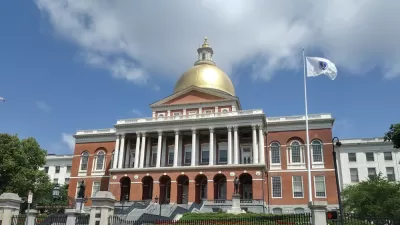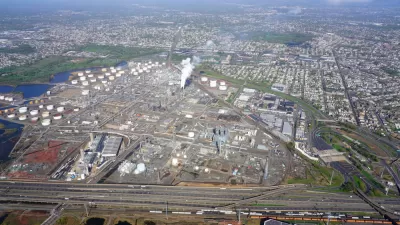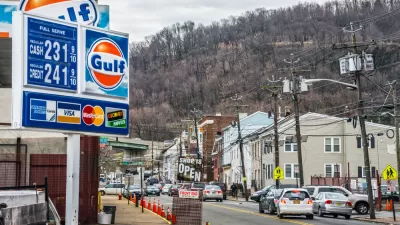Gov. Charlie Baker (R) supports a multi-state proposal to mitigate tailpipe emissions that would increase gas prices and pay for transit projects in an $18 billion transportation bond. A bill has been introduced to ensure that doesn't happen.

"Opponents of the hotly debated Transportation Climate Initiative [TCI] are pushing a bill this week that would force Gov. Charlie Baker to seek approval from the Legislature before enacting the multi-state compact that will hike the cost of gas," reports Lisa Kashinsky for The Boston Herald.
On Dec. 20, Rep. David DeCoste (R-Norwell) introduced House Docket (HD) 4711 which would "prohibit the Commonwealth from participating in the Transportation Climate Initiative," which was referred to the Committee on House Rules on Dec. 30. From the bill's text:
...the Commonwealth of Massachusetts shall not join, implement, or participate in any state, regional, or national low carbon fuel standards program or any similar program that requires quotas, caps, or mandates on any fuels used for transportation, industrial purposes, or home heating without seeking and receiving prior legislative approval from the General Court; provided however, that the Massachusetts Department of Transportation, the executive office of energy and environmental affairs, the department of environmental protection and the department of energy resources may engage in regional and national discussions of such programs.
Hidden gas tax?
Referring to TCI, DeCoste told the Herald, “It’s essentially a tax and you could have potentially never-ending tax increases as a result of this and nobody would ever vote on it.”
The Transportation and Climate Initiative is not a tax but a "regional collaboration of 12 Northeast and Mid-Atlantic states and the District of Columbia that seeks to improve transportation, develop the clean energy economy and reduce carbon emissions from the transportation sector."
What prompted DeCoste to file HD.4711 was the "regional proposal for clean transportation" that the initiative released on Dec. 17 "to establish a cap on global warming pollution from transportation fuels and invest millions annually to achieve additional benefits through reduced emissions, cleaner transportation, healthier communities, and more resilient infrastructure."
Hiroko Tabuchi, a climate reporter for The New York Times, described last month (also posted here) how the market mechanism would work:
Under the program, which could start as early as 2022, fuel companies would buy allowances from the states, either directly or on a secondary market, for every ton of carbon dioxide their fuel will produce...The effort, if it passes, is likely to add to prices at the pump as fuel producers pass on the added costs to consumers, a big point of contention that is likely to arise as individual states debate whether to commit to a final version of the plan.
Not a gas tax
Gas taxes are essentially user fees imposed by federal, state and local governments largely to fund transportation projects and programs, such as road maintenance.
It is true that participating in the TCI proposal would likely add to the price of a gallon of fuel in the same way that costs are added to electricity by the state's utilities for participating in a ten-state collaborative known as the Regional Greenhouse Gas Initiative (RGGI) whose purpose is "to cap and reduce CO2 emissions from the power sector."
In other words, TCI is proposing a cap-and-trade program that is likely to add to fuel costs because motorists essentially will be charged for their carbon emissions, assuming that the fuel suppliers pass-on the costs for purchasing carbon allowances in the auctions. In economic terms, TCI's carbon pricing would address the carbon externality that motorists driving internal combustion vehicles have imposed on the environment. An alternative and perhaps simpler option would be a carbon tax which would be more analogous to a gas tax as the burning of one gallon of gasoline produces roughly 20 pounds of carbon dioxide.
Unlike RGGI, where the utility determines how to spend the carbon auction revenue in order to reduce emissions, TCI gives that authority to the states (and District of Columbia), and that's where the hidden gas tax charge takes on significance.
Cap-and-invest
"Half of the money raised through the [TCI] fees would go toward Baker’s $18 billion transportation bond bill, which includes major investments in the beleaguered Massachusetts Bay Transportation Authority (MBTA)," reports Kashinsky.
The bill, H.4002, was filed on July 25. According to the Office of Governor Charlie Baker and Lt. Governor Karyn Polito:
The bill filed today makes available an innovative, ongoing source of future support by authorizing up to half of the revenue generated by regional market-based compliance programs in the transportation sector, including the Transportation and Climate Initiative (which is currently under development with other Northeast and Mid-Atlantic states and the District of Columbia), to be used to support public transit capital investments that reduce greenhouse gas emissions in the transportation sector. The implementation of this initiative will lead to additional future revenues for investments in transportation infrastructure beyond those included in the bill.
Unlike the bond bill, "Baker could enact the TCI via an executive order," wrote Kachinsky, although he is "under pressure to put TCI before lawmakers."
Gas tax history in the Bay State
“'It’s a back door way of trying to pass a gas tax,' said Holly Robichaud, a Republican strategist who successfully fought to repeal a gas-tax hike in 2014," reported Mary Markos, who covers Massachusetts politics and state government for the Herald. See additional coverage on TCI under her byline.
The gas tax was last increased by the legislature in 2013 - by a mere three cents, but it included annual adjustments to the Consumer Price Index to keep up with inflation, which was repealed by voters the following year [Massachusetts Automatic Gas Tax Increase Repeal Initiative, Question 1 (2014)]. The state gas tax of 26.54 cents per gallon has been unchanged since then.
Hat tip to Katie Pyzyk of Smart Cities Dive.
Related in Planetizen:
- East Coast Considers Plan to Hike Gas Prices to Mitigate Climate Change, December 30, 2019
- Reducing Transportation Emissions by Targeting Fuel Suppliers, October 5, 2019
- An East Coast Cap-and-Invest Approach to Reducing Transportation Emissions, December 20, 2018
-
Massachusetts Voters May Repeal Automatic Gas Tax Indexing, July 31, 2014
FULL STORY: Legislators seek to stop Charlie Baker from passing Transportation Climate Initiative

Maui's Vacation Rental Debate Turns Ugly
Verbal attacks, misinformation campaigns and fistfights plague a high-stakes debate to convert thousands of vacation rentals into long-term housing.

Planetizen Federal Action Tracker
A weekly monitor of how Trump’s orders and actions are impacting planners and planning in America.

San Francisco Suspends Traffic Calming Amidst Record Deaths
Citing “a challenging fiscal landscape,” the city will cease the program on the heels of 42 traffic deaths, including 24 pedestrians.

Defunct Pittsburgh Power Plant to Become Residential Tower
A decommissioned steam heat plant will be redeveloped into almost 100 affordable housing units.

Trump Prompts Restructuring of Transportation Research Board in “Unprecedented Overreach”
The TRB has eliminated more than half of its committees including those focused on climate, equity, and cities.

Amtrak Rolls Out New Orleans to Alabama “Mardi Gras” Train
The new service will operate morning and evening departures between Mobile and New Orleans.
Urban Design for Planners 1: Software Tools
This six-course series explores essential urban design concepts using open source software and equips planners with the tools they need to participate fully in the urban design process.
Planning for Universal Design
Learn the tools for implementing Universal Design in planning regulations.
Heyer Gruel & Associates PA
JM Goldson LLC
Custer County Colorado
City of Camden Redevelopment Agency
City of Astoria
Transportation Research & Education Center (TREC) at Portland State University
Jefferson Parish Government
Camden Redevelopment Agency
City of Claremont





























